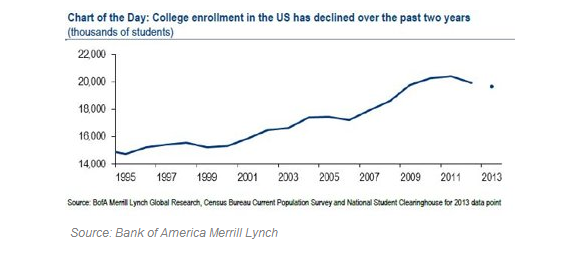

In this June 2, 2014 photo, Wendy Harrison, a waitress at the icon Grill in Seattle, picks up a food order from the kitchen as she works during lunchtime. An Associated Press comparison of the cost of living at several other major U.S. cities found that a $15 minimum wage, like Seattle adopted this week, will make a difference, but won’t buy a lavish lifestyle. (AP Photo/Ted S. Warren)
There’s convincing evidence a college degree is worth it, even at today’s elevated cost. But a growing portion of young Americans are choosing not to give it the old college try.
Calculations by Bank of America Merrill Lynch show that the number of students enrolling in college fell for the second year in a row in 2013, reversing a six-year trend of sharply rising enrollments. The boom in college enrollments clearly coincided with the recession, which ran from 2007 to 2009, and the anemic recovery that followed, as this chart shows:
The biggest drop in enrollments, according to the National Student Clearinghouse, has been at for-profit colleges, which are controversial because they often have the highest dropout rates. Regulators have criticized for-profit schools such as the University of Phoenix and Strayer University (STRA) for failing to offer support programs aimed at keeping kids in school when the going gets tough, and they've put new limits on some student loans at for-profit schools. That's because students who drop out partway through a degree program often end up with onerous amounts of debt but no degree to show for it.
Enrollments at traditional private and public universities rose slightly in 2013. On balance, that means more kids are attending conventional schools while fewer are attending for-profit schools. It still isn’t clear if the decline in overall enrollments will lead to a drop in college degrees earned by students who complete a four-year program. The Education Dept. projects a slight drop in degrees among students due to graduate in 2015, which would correspond somewhat with the drop in enrollments a few years earlier. But the number of college grads ought to continue rising after that, the government predicts.
Fewer college students, better economy?
If the drop in enrollments foretold a less-educated workforce, it might be a worrisome development. But fewer people might be going to college for the right reasons: There are better opportunities elsewhere. “When the economy stinks, people often try to hide in a classroom,” says economist Ryan Sweet of Moody’s Analytics. “The number of job openings now is higher than in recent memory. So the decline in college enrollment is generally a sign of a better economy.”
If high-school grads are bypassing college in favor of minimum-wage jobs with no obvious future, that’s not necessarily a favorable development. But if they’re finding jobs in decent-paying fields such as construction or manufacturing, or signing up for technical training programs that might take a year or two to complete, that ought to be good news.
College isn't for everyone, and when the economy is healthy there are plenty of jobs that don't require a four-year degree yet provide relatively good opportunity. In some industries there’s a shortage of workers with skills that don’t require a college degree, such as welders or medical technicians. It’s hard to tell why more young Americans are bypassing college, but if they’re starting careers in fields where demand for certain workers is strong, that would be good for the economy and the individual both.
Worries about a punishing amount of student debt is probably another factor in the decision to forego a college degree. Study after study has found a college degree still leads to considerably higher lifetime earnings, on average, despite college costs that have risen faster than inflation for years. A recent study by the New York Federal Reserve, for instance, found college grads earn 51% more than those with a high school diploma. And some college education is better than none, as long as you complete the program: Those with a two-year associate’s degree also out-earn the lowly high-school grad, though by less.
The real problem with student debt these days may not be the debt itself but the shortage of decent jobs that allow recent grads to pay off the debt. A new study by the Brookings Institution argues that gloomy tales of college grads drowning in debt are anomalies that exaggerate the problem. “Although there are surely individual borrowers facing financial hardship due in part to their student loans,” Brookings found, “the overall health of the student loan market is not nearly as dire as many popular narratives seem to suggest.” Soon we may be able to say that about the job market for young workers, too.



















